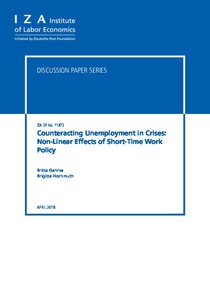Counteracting unemployment in crises: non-linear effects of short-time work policy
"Short-time work is a labor market policy that subsidizes working time reductions among firms in financial difficulty to prevent layoffs. Many OECD countries have used this policy in the Great Recession. This paper shows that the effects of short-time work are strongly time dependent and non-li...
| Main Authors: | , |
|---|---|
| Institution: | ETUI-European Trade Union Institute |
| Format: | TEXT |
| Language: | English |
| Published: |
Bonn
2018
IZA |
| Subjects: | |
| Online Access: | https://www.labourline.org/KENTIKA-19399156124911173389-Counteracting-unemployment-in-.htm |
| Summary: | "Short-time work is a labor market policy that subsidizes working time reductions among firms in financial difficulty to prevent layoffs. Many OECD countries have used this policy in the Great Recession. This paper shows that the effects of short-time work are strongly time dependent and non-linear over the business cycle. It may save up to 0.8 jobs per short-time worker in deep economic crises. The policy becomes more efficient as the recession deepens. In expansions, the effects are smaller and may turn negative. We disentangle discretionary short-time work from automatic stabilization in German data using smooth transition VARs." |
|---|---|
| Physical Description: | 49 p. Digital |

